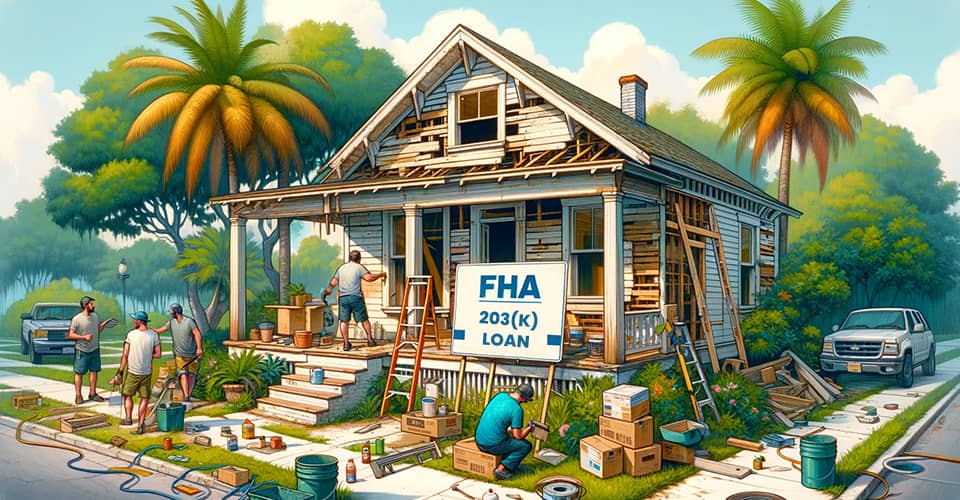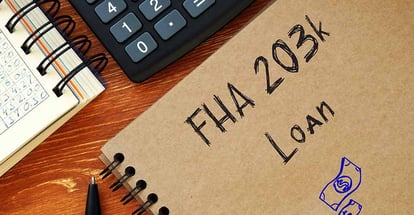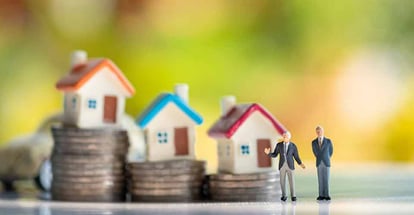Florida Rehabilitation Mortgage 203(k) - Frequently Asked Questions
Table of Contents
- What is a Florida Rehabilitation Mortgage 203(k)?
- Frequently Asked Questions about a Florida Rehabilitation Mortgage 203(k)
- Benefits
- Eligible Properties
- How does a Florida Rehabilitation Mortgage 203(k) work?
- Application Process
- Qualifying Requirements
- Loan Limits
- Types of Renovations Covered
- Down Payment and Closing Costs
- Interest Rates and Terms
- Documentation Required
- Roles and Responsibilities of Borrowers and Contractors
- Potential Drawbacks
- Tips to Make the Most of a Florida Rehabilitation Mortgage
- Alternatives
- Working with a Lender
- Finding a Qualified Contractor
- Bottom Line
What is a Florida Rehabilitation Mortgage 203(k)?
The Florida Rehabilitation Mortgage 203(k) is a program designed to provide financing for the purchase and renovation of properties requiring repair. It enables borrowers to secure funds for both the acquisition and the renovation of a home in one single loan.
Understanding the Florida Rehabilitation Mortgage 203(k) is crucial for potential homeowners and investors. It works as an inclusive package that speeds up the process, reduces paperwork, and helps realize the dream of owning a transformed property.

Frequently Asked Questions about a Florida Rehabilitation Mortgage 203(k)
Cutting through the noise of finances, we tackle your burning questions about 203(k) Rehab Mortgages in Florida. From qualifications to loan limits, rest assured, we've got answers.
Delve deeper with us as we explore Florida's Rehabilitation Mortgage 203(k) FAQs. We aim to clear up any confusion surrounding operational aspects, documentation, potential drawbacks, and more.
Your concerns about Florida Rehabilitation Mortgage 203(k) are important to us. We address the application process, roles, responsibilities of borrowers, and contractors, even alternative mortgage options.
Benefits of a Florida Rehabilitation Mortgage 203(k)
The Florida Rehabilitation Mortgage 203(k) presents a versatile solution for homebuyers and investors, providing key benefits that make it a valuable tool in the real estate market.
-
Access to funding for purchase and renovation under one mortgage.
-
The ability to transform distressed properties into valuable real estate.
-
Lower interest rates compared to other loan types.
-
Opportunity to build instant equity in the property.
- Flexibility on the types of renovations eligible.
Eligible Properties for a Florida Rehabilitation Mortgage 203(k)
Florida Rehabilitation Mortgage 203(k) is ideal for properties requiring substantial repair or remodeling. This program impressively covers a wide range of property types.
- Single-family homes
- Duplex properties
- Triplex or fourplex units
- Condos in FHA-approved projects
- Mixed-use properties
- Homes requiring significant repairs
How does a Florida Rehabilitation Mortgage 203(k) work?
Unpacking the functionings of a Florida Rehabilitation Mortgage 203(k), this loan works by combining both the cost of purchasing the property and the rehabilitation costs into a single loan, simplifying the process for borrowers.
The loan amount is based on the projected value of the property once the improvements are completed, rather than the current value.
A Florida Rehabilitation Mortgage 203(k) loan packs the purchase and rehab costs into a single loan based on the post-renovation property projection, with remodel funds released as the work progresses.
The operational mechanics of this loan are also quite unique. Firstly, after the loan closing, the mortgage proceeds are placed in an escrow account. These funds are then released in draws to pay for the renovations as they are completed.
A Florida Rehabilitation Mortgage (203k) loan allows borrowers to condition their home before moving in. Following property purchase, this loan provides a preset time for renovation, which should be completed by licensed contractors.
In the event you choose to finance your house renovations into your loan, an independent appraiser is employed to calculate the after-renovation value of the property. This estimated value proves central to calculation of the overall loan budget.
Application Process for a Florida Rehabilitation Mortgage 203(k)
Moving through the application process of a Florida Rehabilitation Mortgage 203(k) may seem complex, but it can be simplified when approached stepwise.
It encompasses a sequence of well-organized processes designed with the borrower's convenience in mind.
-
Begin with a thorough assessment of your financial situational and housing needs.
-
Seek professional advice from a knowledgeable lender specializing in 203(k) loans.
-
Identify a suitable property that fulfills the eligibility criteria.
-
Get professional estimates of the cost of the needed renovations.
-
Submit a detailed and comprehensive loan application package to the lender.
- Upon approval, collaborate with chosen contractors to initiate project work after loan disbursement.
Qualifying Requirements for a Florida Rehabilitation Mortgage 203(k)
The qualification requirements for a Florida Rehabilitation Mortgage 203(k) encompass credit history, income stability, and property eligibility among other considerations.
These factors contribute to a comprehensive evaluation determining a borrower's ability to manage the loan.
-
A minimum credit score usually between 580 to 620 is requisite.
-
Steady income and proof of employment or stable source of income is mandatory.
-
The property must be a one to four-unit building that has been completed for at least a year.
-
The home must be either your primary residence or a property you plan to live in after renovation.
-
The renovation cost must be at least $5,000.
-
Current homeowners may refinance their home and include the renovation costs in their loan.
- The borrower must hire a HUD-approved consultant if the renovation estimate exceeds $35,000.
Loan Limits for a Florida Rehabilitation Mortgage 203(k)
The loan limit for a Florida Rehabilitation Mortgage 203(k) is set annually by the Federal Housing Administration (FHA). It is determined according to the area's median house price, making it a representation of the local real estate market.
As of 2023, the maximum loan amount ranges from $356,362 to $822,375. The exact balance that you can borrow will depend on factors such as property location, renovation cost, and the FHA's lending limit for your county.
Types of Renovations Covered by a Florida Rehabilitation Mortgage 203(k)
A Florida 203(k) Rehab Mortgage can finance a diverse array of home improvements. Common types include structural alterations, room additions, handicapped accessible modifications, and aesthetic upgrades.
Under Florida's 203(k) Mortgage, homeowners can also cover costs for roofing, flooring, plumbing, and HVAC system renovations. Energy efficiency enhancements such as solar panel installation are also included.
This loan doesn't support luxury renovations. Hence, projects like constructing swimming pools, saunas, or tennis courts aren't covered.
It's important to note that the renovations must begin within 30 days of loan closure, and complete within six months, ensuring the property remains livable and value-adding.
Down Payment and Closing Costs for a Florida Rehabilitation Mortgage 203(k)
Obtaining a Florida Rehabilitation Mortgage 203(k) requires a down payment. Often, this sits between 3.5% to 20% of the loan's total value. Be prepared to make this investment up front.
Closing costs for a Florida 203(k) Rehab Mortgage encompass various fees, ranging from appraisal costs to loan origination fees. An estimate is usually provided to borrowers for better financial planning.
Considering the total rehab costs, the down payment for a Florida 203(k) Rehab loan is comparatively less. Making it a viable option for many prospective home buyers and investors.
Bear in mind, the final closing costs will vary, depending on the rehab work, the property's location, and the loan terms. It is, therefore, essential to have an accurate financial understanding.
Typically lenders allow a degree of flexibility in payment. The closing costs for the 203(k) Rehab Mortgage are often negotiable or can sometimes be rolled into the loan, easing the financial burden.
Interest Rates and Terms for a Florida Rehabilitation Mortgage 203(k)
Making sense of interest rates and terms of the Florida Rehabilitation Mortgage 203(k) is the first step to securing a favorable deal. This type of loan typically has competitive rates and varied terms to cater to different borrowers' needs and financial situations.
Knowledge about the interest rates and contractual terms for a Florida 203(k) mortgage will help you secure the best deal. These rates and terms may differ based on your creditworthiness and other lenders-specific considerations.
Florida 203(k) mortgages can offer flexibility, allowing borrowers to select the loan period that best fits their financial capability. It's crucial to fully understand these terms to manage repayments effectively and avoid potential financial pitfalls.
Documentation Required for a Florida Rehabilitation Mortgage 203(k)
To secure a Florida Rehabilitation Mortgage 203(k), prospective homeowners need to provide essential paperwork. This includes proof of income, tax returns for the past two years, proof of employment, and credit history to ascertain fiscal responsibility.
Next, a detailed proposal of the desired renovations is necessary. This should include specific upgrades, their projected costs, and a timeline for completion. This document must be prepared by a licensed contractor to assure accurate cost estimation and feasibility.
Subsequently, homeowners should provide a certified appraisal of future property value post-renovation. This helps lenders estimate both risk and reward factors, lending credibility to your mortgage application.
As the 203(k) loan includes renovation costs, borrowers must offer a preliminary agreement with a HUD-approved contractor. This agreement outlines specific renovation details, costs, and timeframes.
Lastly, for properties purchased as rental investments, borrowers need to provide an affidavit confirming the intention to occupy the property for at least six months of the year.
This documentation forms a key component of the Florida 203(k) Rehab Mortgage application process.
Roles and Responsibilities of Borrowers and Contractors in a Florida Rehabilitation Mortgage 203(k)
In Florida 203(k) Rehabilitation Mortgages, the borrower's role revolves around qualifying for the loan, selecting a property, and finding a HUD-approved contractor.
They should thoroughly discuss renovation plans and cost details with the contractor, ensuring they align with the loan's terms.
On the flip side, enlisted contractors bear the responsibility of completing the renovation work according to the agreed-upon plans and schedule. They should provide reliable cost estimations and comply with all local construction codes and regulations.
Also critical is the synergy between borrowers and contractors. Both parties must work hand-in-hand to ensure a seamless transformation process, meeting all loan requirements and renovation objectives.
Potential Drawbacks of a Florida Rehabilitation Mortgage 203(k)
A drawback of Florida's 203(k) Rehab Mortgages is the stringent guidelines. Loan recipients must complete specific paperwork and meet stringent building standards, potentially slowing the rehab process.
Additionally, these loans could incur more costs. Borrowers may need to hire a consultant, architect, and contractor, each of which comes with their charges.
The complexity of a 203(k) loan program can also be a disadvantage. The comprehensive nature of the loan, stretching from the acquisition through to the rehab, adds extra levels of potential difficulties.
Lastly, the limited choice for contractors can prove to be a disadvantage. The contractor must be 203(k) loan approved, restricting the borrower's options.
Tips to Make the Most of a Florida Rehabilitation Mortgage 203(k)
To maximize the potential of your 203(k) Rehab Loan, meticulously planning your renovation can bring massive payoffs. Prioritize essential repairs over aesthetic improvements and ensure resource allocation aligns with your intended return on investment.
Understand tax implications. Your 203(k) loan can potentially bring forth significant tax benefits, and understanding these underlying opportunities can optimize your loan use and maximize its benefits.
Don't miss out on property value uplifts. Focus on renovations that not only fix current issues but also add value to your property. Analyzing recent sales of similar properties and assessing what boosts their value can be instrumental.
Finally, pick accredited professionals with substantial 203(k) experience. Their expertise can help avoid common pitfalls, ensure a smoother loan application process and project execution, ultimately helping you reap your Florida Rehabilitation Mortgage 203(k) benefits.
Alternatives to a Florida Rehabilitation Mortgage 203(k)
Those in pursuit of property rehabilitation in Florida are not bound solely to the Rehabilitation Mortgage 203(k).
A rich array of alternative loan options are available, including HomeStyle Renovation loans, hard money loans, and personal renovation loans. These may cater to varying investment strategies and risk dispositions.
HomeStyle Renovation loans are similar to the 203(k) but offer more leeway in terms of the renovations that can be financed. Hard money loans can be faster to obtain and offer more flexibility, however, they often come with higher interest rates.
Another alternative route is via private lenders offering personal renovation loans. Promising rapid approval and flexible terms, they form a viable alternative for those undeterred by potentially higher fees.
Understanding the proposed alternatives to a Florida 203(k) Rehabilitation Mortgage is crucial. It enables Florida real estate investors and homebuyers to make an educated decision aligning with their financial and personal circumstances.
Working with a Lender for a Florida Rehabilitation Mortgage 203(k)
Securing a Florida 203(k) Rehab Mortgage requires efficient collaboration with your lender. Establish open communication lines, set clear expectations, and continually update them on your project's progress to smoothen your rehab mortgage journey. These steps create a roadmap to successful lender relations.
Understanding financial terms and policies will help you collaborate effectively with your 203(k) Rehab Loan Lender. Don't shy away from asking questions; instead, use every interaction as a learning opportunity to master the money game.
In addition, maintain a good credit score and manage your finances well. Your lender will view this positively and it can boost the approval chances of your Florida 203(k) Rehab Mortgage application. Let your smart financial habits ease your collaboration with your lender.
Finding a Qualified Contractor for a Florida Rehabilitation Mortgage 203(k)
When selecting a contractor for your Florida 203(k) Rehab project, it's crucial to scout for talent meticulously; considering their experience, licensing, and past project reviews to ensure a hitch-free renovation.
The hunt for the ideal contractor for your Florida 203(k) Rehab Mortgage project should prioritize high-quality workmanship; validate their expertise through testimonials and a portfolio of similar projects for a successful renovation.
Bottom Line
The Florida Rehabilitation Mortgage 203(k) is a comprehensive loan program designed to finance the purchase and renovation of properties in need of repair.
For prospective homeowners and investors, this loan offers the advantage of combining property acquisition and rehabilitation costs into a single package.
This simplifies the financing process and presents an opportunity to transform distressed properties into valuable real estate assets.
Key points to consider include the loan's unique features like lower interest rates, diverse property eligibility, and flexibility in renovation types.
It's essential for borrowers to understand the application process, loan limits, interest rates, required documentation, and the roles and responsibilities of both borrowers and contractors.
While the 203(k) loan offers multiple benefits, it's also essential to be aware of potential drawbacks and alternative financing options.
Making informed decisions, prioritizing essential repairs, understanding tax implications, and working with experienced professionals can optimize the benefits of this loan.
Whether you're aiming to refurbish a primary residence or looking for a savvy investment, the Florida Rehabilitation Mortgage 203(k) can be a transformative financial tool.
With over 50 years of mortgage industry experience, we are here to help you achieve the American dream of owning a home. We strive to provide the best education before, during, and after you buy a home. Our advice is based on experience with Phil Ganz and Team closing over One billion dollars and helping countless families.

About Author - Phil Ganz
Phil Ganz has over 20+ years of experience in the residential financing space. With over a billion dollars of funded loans, Phil helps homebuyers configure the perfect mortgage plan. Whether it's your first home, a complex multiple-property purchase, or anything in between, Phil has the experience to help you achieve your goals.


 By
By  Edited by
Edited by 






